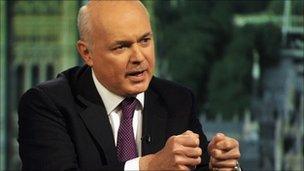Benefit reforms could 'push thousands into poverty'
- Published

Iain Duncan Smith: White Paper next week
Thousands of people could be pushed into poverty by changes to incapacity benefit, a charity has warned.
Iain Duncan Smith, Work and Pensions Secretary, says his reforms could be the biggest change to the welfare state since it was founded.
Disability Alliance has said up to a million people with long term sickness or disability could be affected.
The government says getting people back into work is a priority, but there would always be a safety net.
Douglas Alexander, the shadow work and pensions secretary, has said that Labour could support testing the availability for work of incapacity benefit claimants.
Under the plans, claimants face a new 12-month cap on their benefits, if ruled able to work. People who cannot work, for example the terminally ill, would be given support with no time limit.
Mr Duncan Smith, in an interview with the Daily Telegraph, said his reforms - which are expected to be outlined in a White Paper next week - were "the biggest change since Beveridge introduced the welfare system".
He plans to introduce a simplified benefits system, where as many as 30 different schemes are replaced with a single universal credit.
It is changes to Housing Benefit which are among the most controversial, though. Mr Alexander, in comments given to the Guardian, external, said Labour "could consider" a proposal to reduce housing benefit payments, if the changes were phased in and reduced in scope.
He said housing benefit had been used to take too much of the strain "for generation-long failures in the housing market, principally the the lack of affordable homes to rent and buy".